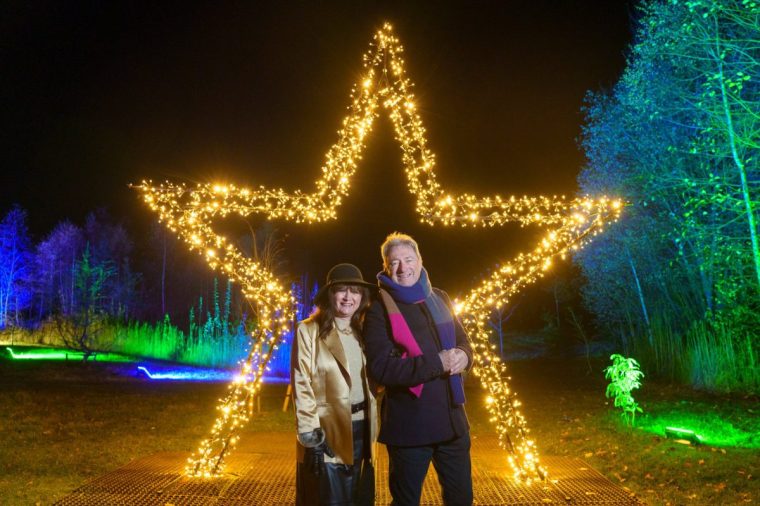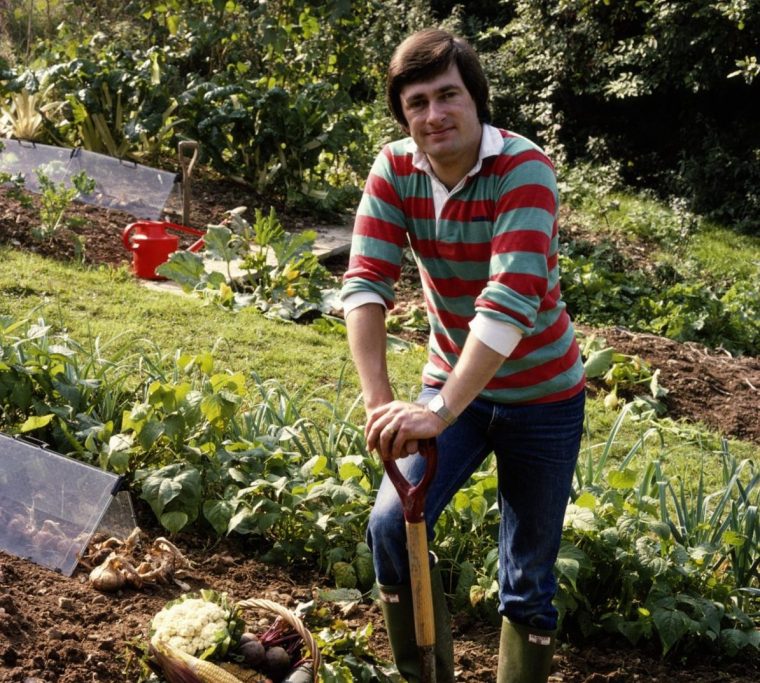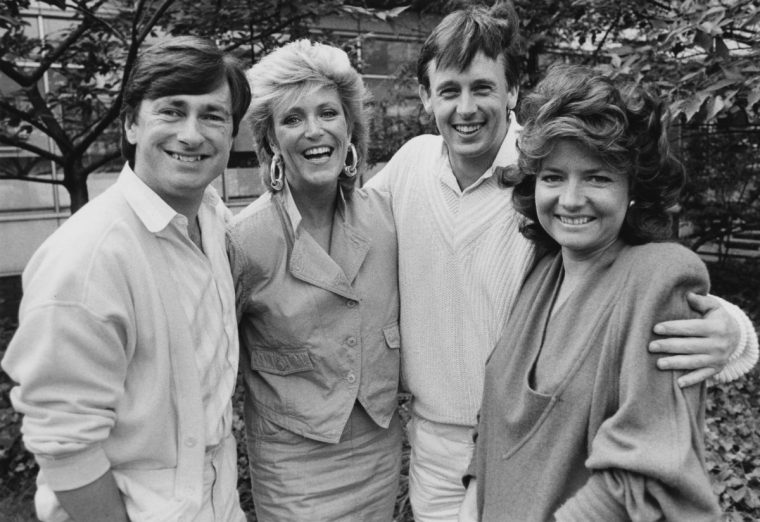“Our album’s gone to number one on the iTunes chart!” gushes Alan Titchmarsh within seconds of calling me. “And the single’s at number two! I know it sounds boastful but… well, it’s all very nice.”
An affable stalwart of daytime telly and radio since the 70s, Titchmarsh’s earthy, Yorkshire tone is so familiar that it feels like he’s just popped his head over the garden fence. The unfiltered self-promotion that partly inspired Steve Coogan to create Alan Partridge back in the 90s, and in 2000 saw him tell Ground Force viewers that he’d been voted “the sexiest man on telly after George Clooney”, is actually rather endearing. Given the predatory behaviours so long concealed by so many TV presenters of his vintage, Titchmarsh’s childlike tendency to self-puff a little actually makes the 75-year-old broadcaster feel like a refreshingly open book.

And why shouldn’t he be proud of his new album Jack Frost: A Winter Story? It’s an unrepentantly grandpa-core record in the cosy, seasonal tradition of Howard Blake’s 1982 soundtrack to The Snowman, on which his gentle spoken word sections conjure scenes of the British winter over a sparkling orchestral score by Debbie Wiseman (Classic FM’s Composer in Residence, best known for her award winning 2015 score to the BBC adaptation of Hilary Mantel’s Wolf Hall). His descriptions of children pulling on their scarves, and owls hooting beneath milky moons, give way to two carols – one sung by soprano Grace Davidson and the other by Cerys Matthews and her 12-year-old son Red Abbott Matthews. Their vocals skate over soft smooth slopes of echoey piano, the icy tingle of pinged triangles and curling tendrils of the oboe.
Sixty-one-year-old Wiseman has form crafting the orchestral equivalent of velvet cushions on which to display Britain’s national treasures. The trend began when she topped the classical music chart with her first Titchmarsh collaboration – The Glorious Garden – in 2018. Since then, she’s repeated the trick by underscoring Stephen Fry reading from his 2017 book on Greek mythology in 2020; then Helen Mirren and Damian Lewis recounting the history of the British monarch on 2021’s The Music of Kings and Queens.
Jack Frost, explains Titchmarsh, was inspired by memories of growing up in the 50s: “I remember waking up to those beautiful feathers of frost on the inside of the window pane. I’m not just being nostalgic – although we had to go to bed early to keep warm in the days before central heating, we also got to enjoy the magic feeling you get reaching out your fingers to scratch the ice from the glass. It was quite a wonderful sensation.”
Although frost is often seen as the gardener’s nemesis, Titchmarsh tells me it’s only a problem if it comes at the wrong time of year. “Late frosts are a pain, but otherwise they’re marvellous,” he says. “Frost kills pests. It’s a crucial part of the cycle. It gives plants a period of dormancy – a good sleep – which they need as much as we do. It helps them to regroup and get their energy back.”
He’s looking out of the window as we talk – “looking out over the beautiful bare branches of the trees” – in his Hertfordshire garden. “I’m always out there at 1pm on Christmas Day while everybody else is tucking into the wine and nibbles because it’s the one time of the year you might just get to enjoy the silence – no traffic, just the sounds of nature.”
Born in the spring of 1949, in Ilkley, West Yorkshire, Titchmarsh has loved gardening since his childhood. He has an old photograph of himself as a toddler in bloomers, following his grandfather between the bean poles of his allotment. The plumber’s son can still remember the scent of the sweet peas and the glint of the Cadbury’s cocoa tin lids that were strung from the canes to deter birds.

His earliest memories find him on his back in the family’s 40ft back garden, covered in post-war blackout fabric (with just a small hole above his eyes) and waiting for the birds to land around him. As a young lad he bought a couple of packets of seeds from Woolworths and traces his gardening addiction to their germination. “If those seedlings hadn’t come up – all around the imprint of my dad’s boot – then I’d probably have moved on to another hobby. But up they popped and there we are!”
He left school at 15, in 1964, with just one O-level (in art) and worked as an apprentice gardener with Ilkley Council before studying horticulture, and steadily working his way up to a diploma placement at the Royal Botanic Gardens in Kew. In 1974, he left to pursue a career in gardening journalism, then gardening books. He got his lucky break in 1979 when the BBC magazine programme Nationwide sent him to report on a plague of greenfly in Margate. His easy-going charm and muck-in attitude saw him instantly snapped up to present gardening spots for Breakfast Time before he moved on up to interviewing celebrities on the Pebble Mill sofa for a decade.
Sitting under the lights with everyone from Placido Domingo to Bette Davis and Julia Roberts (to whom he gave one of his gardening books) he was mocked by critics for his blandness.
When journalist Lynn Barber asked him why he didn’t ask tougher questions he hit back: “Why would you want to? You can ask an aggressive question that makes you look good, but if you don’t get an answer then it’s a waste of time.” He wanted his viewers – and the guests who were “mostly entertainers, not politicians who needed holding to account” – to have “a nice conversation”. It’s a simple goal that has a rather restful, retro appeal in these days of clickbait.
A “quiet churchman” who has previously said his ideal political party would “reward personal endeavour, but also look after those who can’t look after themselves”, he’s conservative with a small c. Today, he puts some of his style down to “basic manners”.
“I was brought up to say please and thank you,” says Titchmarsh. “For the most part, the guests on Pebble Mill were also very polite. But there was the odd exception. I’ve been in situations where famous people have been rude to waiters or waitresses and I find that unbearable. In those situations I will just get up and go.” He won’t name names, of course. “People always ask interviewers, ‘What were they REALLY like?’ don’t they? I remember the second time I interviewed Joan Collins, I told her people had asked me what she was like ‘close up’. She thrust her face towards me and said: ‘Well??!’ I said: ‘Very good!’”

After Pebble Mill, Titchmarsh returned to TV gardening in the summer, retreating to his shed in the fallow season to write romantic fiction. His sex scenes became famous for their reliance on fluffy white bathrobes. In 1998, he was the runner-up in the Literary Review Bad Sex Award for excruciating erotic writing – nominated for a passage in his novel Mr MacGregor about a TV gardener with an irresistible sexual magnetism. It ran: “She planted moist, hot kisses all over his body. Beads of sweat began to appear on Guy’s forehead as he became more entangled in the lissom limbs of this human boa constrictor. For fully 15 minutes their mutual passion heightened, with groans, sighs and liquid noises.” Funny. But there was some truth in the fictionalised self-portrait, as staff at Madame Tussauds told the press they ended most days by wiping multiple lipstick marks from Titchmarsh’s waxwork.
Titchmarsh took all the knocks on the chin, with a chuckle. He’s quite comfy – and very successful – being middlebrow and has no time for snobs. Headlines this winter knocked one of his suburban backyard makeovers on Love Your Garden because he’d brought in fake medieval ruins and given a shed a mock Tudor shell. But he tells me he was “very proud” of the transformation he’d wrought in the foster carers’ garden. “I like it, they like it – what’s wrong with that?!” The featured couple have fostered over 150 children and today Titchmarsh – who has two adult daughters and four grandchildren with his wife Alison – stresses the importance of getting kids out into the garden.
He thinks his Boomer generation mostly had a “direct engagement” with the outdoors because there wasn’t much else to do. “Today, kids have forest schools [nature-based outdoor education], so I think the generation in the middle might be worst at gardening. But I do still meet children who don’t know that potatoes grow underground, children who are scared to see big trees swaying. When I did workshops we would encounter kids who thought the soil was disgusting. Most kids will stop engaging as teens, so you need to get that grounding in when they’re small so they can return to it later with confidence.”
Gen Z’s fascination with houseplants has delighted him. When I point out this is because that generation can’t afford outdoor spaces he pushes back. “We had it hard in the 70s too,” he argues. “When Alison and I bought our first house in 1975 the mortgage was a priority and you had to really save up for other things. These days, young people are expected to have far more things that put a drain on their income: mobile phones, Netflix, Starbucks. We did not have those luxuries. I’m not saying that we had it harder. But I think it was just as difficult. I think it’s uninformed of younger people to assume we had it easy. It’s always been tough.”
Titchmarsh is mildly concerned to see garden centre sales flattened in 2024, down by five per cent on 2023. “The pandemic brought people out into their gardens, showing them what potential was there both in the soil and in themselves,” he says. “I fought long and hard to get garden centres opened up because it was crazy that people could go to supermarkets but not outdoor garden centres. Getting outside and growing things is so important for mental health.”
On Desert Island Discs in 2002, he famously said he thought Osama Bin Laden might not have become a terrorist if he’d been given seeds to plant. Does he stand by that view? “I think so, yes,” he says. “Gardening teaches you respect for life, for the planet, for humanity. With the news that is being blasted at us 24/7, so much bad news, it becomes essential.” On top of this he worries for young people negotiating social media which he believes is “like fire – a good servant and a bad master.”
Titchmarsh stresses that “even at my age, I make sure I get out into the garden every day”. He’s as prone to fretting about “wars and climate change” as everybody else. “Those fears are well grounded,” he says. “But they mustn’t override our appreciation for the world that’s directly around us.”
As we end our call, Titchmarsh gives me some advice on keeping my poinsettia plant alive until Easter – “Keep it away from too much direct sunlight, about a metre from the window and don’t overwater!” – and mulls over the reason for his enduring appeal. He suspects we can put it down to “being the same person off the box as I am on it. People always tell me that’s a relief!” he laughs.
“In the end, I think there’s a lot to be said for just bumbling along through life and doing your best.”
Alan Titchmarsh’s album, Jack Frost: A Winter Story, is out now












